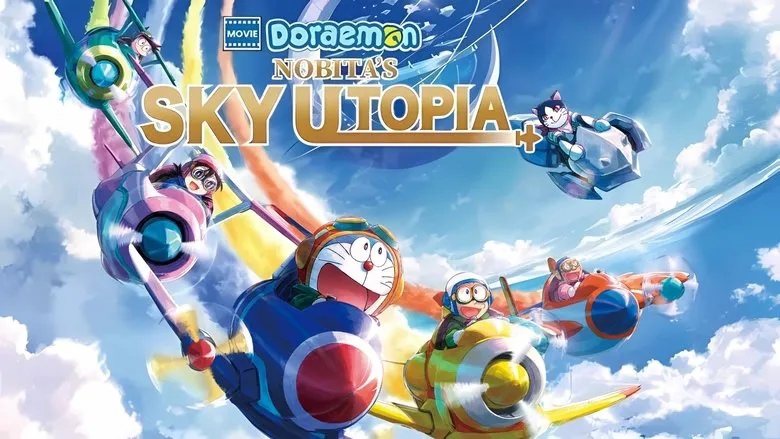A Nostalgic Dive into “Doraemon: Nobita’s Sky Utopia”: A Contemporary Review
For those of us who spent our formative years in the 80s, Doraemon, or “Little Ding-Dong” as it was fondly known in some regions, was more than just a cartoon; it was a cherished companion. The timeless adventures of the robotic cat and his perpetually clumsy friend, Nobita, shaped our childhoods and sparked our imaginations. So, when news broke that a new Doraemon film was hitting the big screen, how could I resist a nostalgic trip back to those simpler times? I eagerly headed to the theater to experience “Doraemon: Nobita’s Sky Utopia.”
The Allure of Utopia: A Synopsis
The film opens with Nobita, overwhelmed by the pressures of school life, yearning for an escape. Serendipitously, he and Doraemon stumble upon the opportunity of a lifetime: a quest to find the elusive “ideal utopia” nestled high in the skies. They embark on a thrilling journey aboard a time-traveling zeppelin, hurtling through time and space towards their destination. Upon reaching this supposed paradise, they aspire to become the “perfect elementary school students.”
However, the shimmering façade of utopia soon crumbles, revealing a sinister plot orchestrated by the nefarious Dr. Ray. His true intention is to control the minds of the inhabitants, robbing them of their individuality and turning them into mindless drones. Doraemon and Nobita, along with their friends, must rise to the challenge, banding together to dismantle the “Sky Utopia” and expose Dr. Ray’s wicked scheme. Through this adventure, they come to the profound realization that there is no such thing as a “perfect elementary school student,” and that it’s perfectly acceptable to embrace their own unique flaws and imperfections.
Echoes of Adventure and Innovation: Praises
Doraemon reigns supreme as a national-level super IP in Japan, and “Nobita’s Sky Utopia” rightly earns its place among the most outstanding animated films in the series in recent years. It masterfully encapsulates the timeless emotional core that has captivated audiences for generations: adventure, friendship, and a poignant sense of nostalgia.
The film’s depiction of zeppelins and the sky utopia itself is a showcase of imaginative technological marvels. From single-person elevators and projection newspapers to portable aircraft, artificial floating cities, and intelligent flying robots, the film is brimming with creative concepts that ignite the imagination. Furthermore, the film pays delightful homage to the beloved classics with appearances of our most familiar time machine and the iconic bamboo copter. In sum, “Nobita’s Sky Utopia” stands as a testament to the enduring appeal of the Doraemon franchise, boasting exceptional adaptation and earning impressive ratings, surpassing other films released during the same period.
Lost in Translation?: Shortcomings
Originally conceived by Fujiko Fujio in 1972, the Doraemon series weaves a tapestry of enchanting stories centered around Doraemon, the robotic cat hailing from the 22nd century, and Nobita Nobi, the perpetually clumsy elementary school student. The animated series has bestowed upon us countless unforgettable memories, fueled by its boundless imagination and heartwarming narratives.
However, compared to the charming romance and lighthearted humor that define the animated series, the film version takes a decidedly more serious tone, resulting in a noticeable absence of the characteristic Doraemon liveliness. While the animated series subtly encourages introspection and reflection, the film version sometimes veers into preachy territory.
A Reflection on Chinese Animation
In recent years, Chinese animation has exhibited encouraging advancements, with significant strides in both storytelling and special effects of foreign blockbusters. However, a noticeable gap persists in the realms of creativity and major IPs.
Exam-oriented education might stymie the boundless imaginations of Chinese creators, resulting in a relative lack of imaginative depictions of future technology, even as real-world technological advancements rival those of global superpowers. Moreover, major IPs tend to rely heavily on familiar narratives, essentially rehashing established content. The excessive commercialization, with its singular focus on profit maximization, leaves little room for nurturing the spiritual core that is essential for cultivating national-level major IPs.